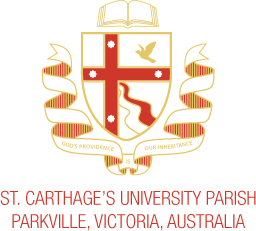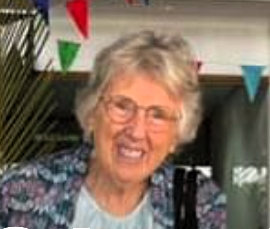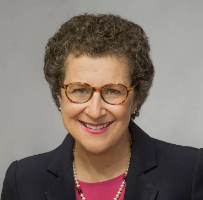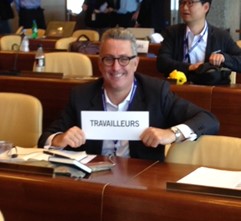St Carthage’s Church is situated at 123 Royal Parade, Parkville, directly opposite residential colleges of The University of Melbourne
St Carthage’s is central to many academics of Melbourne University and surrounds, welcoming current students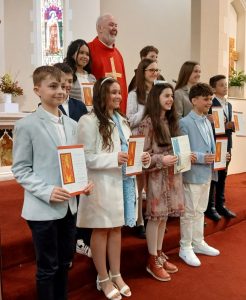 and alumni of the University. We welcome and hold/sustain people from all walks of life. The congregation gathers from a wide range of suburbs across Melbourne as well from a wide diversity of cultural backgrounds.
and alumni of the University. We welcome and hold/sustain people from all walks of life. The congregation gathers from a wide range of suburbs across Melbourne as well from a wide diversity of cultural backgrounds.
The first priority of the Parish is to provide a welcoming and caring community, an inclusive and inspiring liturgy, and commitment to social justice and Gospel values.
People of the University must be able to bring their diverse fields of study to a community that searches and explores a quest for faith in today’s world.
The congregation gathers in the name of Christ to attend his flock at either Saturday 6pm vigil mass or 10am Sunday mass, each with a distinctive focus be it reflective, family centered, or, a Celebration of the Eucharist for students in particular.
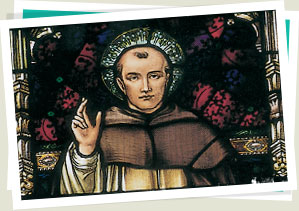
The Parish group has a wide variety of group activities such as St Vincent de Paul Conference, the Feminist Theology Group, the Men’s Reading Group, the Women’s Review of Life and Prayer Group and the Parish Hospitality Group.
The Presbytery and Parish Centre at 30 Bayles Street, Parkville is frequently used by all Parish organisations and is also a place for hospitality.
St Carthage’s Parish Values
This document, submitted to the 2023 Synod of Bishops, is based on prayerful consultation within St Carthage’s Parish.
- EXPERIENCES OF CHURCH
While the local church community is perceived as providing mutual support, there is also a widespread feeling of frustration about the lack of visible commitment within the episcopate to the cause of reform and renewal pursued by Pope Francis. While this involves acknowledging the reality of sexual abuse, such reforms must go beyond this, involving a return to the values of human dignity central to the Gospel. There is perception of the Church retreating into a silo, and repeating platitudes lamenting the influence of secularism. The Church must draw on the skills and insights of all its members, not just those of a small leadership elite. Many people do not experience “the common dignity of all the baptized” (par. 5) It needs much more attention and clarity as to how the Church can become an inclusive, open and welcoming Family of God (par. 16), especially to the hurt and disillusioned. Church leadership is perceived as remaining a male bastion, generating a catastrophic loss of confidence among those raised in its traditions, evident not just in decline of vocations to religious life (as if the word vocation was relevant only to rejecting married life), but in broader participation in sacramental life.
- CHALLENGES TO ADDRESS
The planet is undergoing an ecological crisis unparalleled in its history. It must be a collective responsibility for all Christians to care for creation, as laid out by Pope Francis in Laudato si’, and to promote this as central to our calling. The Church must be involved in this movement. While the need for greater involvement of women in ecclesial structures was mentioned in par. 60-72, there was surprisingly little in the document about a transformation in awareness of multiple forms of gender and sexuality. Widening the tent must involve recognition that the eucharist should not be denied to those classified by the church authorities as outside communion because of their marital state or sexual identity. There is a need for reconceptualising official roles of leadership in the church, namely in considering the role of deacon, priest and bishop as able to be undertaken by women as much as men. The notion of priestly celibacy (which assumes that marital state is more important than moral probity) lacks foundation in scripture and is seen as symptomatic of the Church belonging to a past era, not recognising how society has changed.
- PRIORITIES AND CALLS TO ACTION
Ordain women in the role of deacon, a category that refers to service not to gender. Denying ordination of women as deacons contradicts scripture (Rom. 16:1-2). The example of the Anglican Church shows that women are fully able to serve as priests and bishops. The Church must recognise pluriformity—different modes of being faithful to the gospel, whether through liturgical practice or sexual identity, just as much as through other forms of social identity. It demands reassessing traditions in the light of the Gospel. Pastoral Councils must become normative, and women must be involved at every level of decision making. Transparency needs to be brought to the forefront. The laity must be involved in decision-making at every level. Par. 20 rightly draws attention to the scandal of abuse. It needs to address the question of how the Church can regain moral authority when some bishops are perceived as still protecting the status and privilege of their peers rather than exposing the persistence of abuse? Synodality must be based on true metanoia, or our Church will continue to lack any congruency with the teachings of Christ. For the bishops to inaugurate public liturgies of lamentation and repentance would be a start.
Summary
- Church leaders and communities must publicly commit themselves to the cause of caring for creation as a core Christian responsibility as outlined in Laudato si’. Moral behaviour must be seen as involving corporate social behaviour as much as individual behaviour.
- Church leaders must commit themselves to pursuing Pope Francis’s campaign to overcome the dangers of clericalism through true synodality, understood involving all levels of the community of the baptized. There is a need for conscious efforts to avoid resorting to condescending platitudes about religious devotions, without understanding that synodality must be based on true metanoia, or our Church will continue to lack any congruency with the teachings of Christ.
- Acknowledging the dignity of all the baptized, including those who are divorced and identifying as LGBTQ+, as able to receive the eucharist.
- Expanding the role of deacon as relevant to women as much as to me, and exploring how the role of priests and bishops can be extended to women as much as man.
- Revisiting the rules of celibacy as a requirement for priestly ministry, as part of a deeper reinterpreting of what vocation may mean (as applying to all people, not just a religious elite)
- Mandating the practice of establishing pastoral councils at parish and (arch)diocesan levels, involvement of women at every level of ecclesial organisation and responsibility.
- Bishops to be involved in public liturgies of lamentation and repentance for having allowed sexual abuse to go unpunished for decades, without regard for its consequences in the community.
GETTING TO KNOW OUR PARISHIONERS
Sr Joan Healy RSJ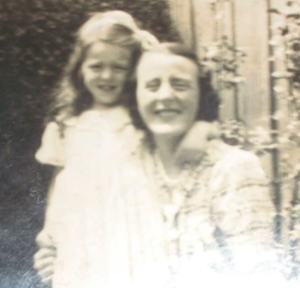
In order to get to know our parishioners, we are encouraging members of the parish to introduce themselves, their interests and connection to St Carthage’s by writing a piece of 500 words (max). If you would like to submit something, or know someone who could be invited to submit something, send a message to Constant.Mews@monash.edu
It is 1989 and Sr Joan Healy RSJ is working at a refugee camp on the Thai–Cambodian border, where she will be based for some time. In this camp, where asylum seekers are restrained by barbed wire and armed guards, she meets a young man—a medic and battlefield surgeon. He speaks to her of the broader needs of the asylum seekers, and of his dream of creating a professional health clinic incorporating Cambodian healers, where the spirit of these people can become strong again. He is 31 years old when they meet. The idea had been that Sr Joan would mentor him, but it is he who mentors her as he speaks of what it might mean to heal the heart and spirit.
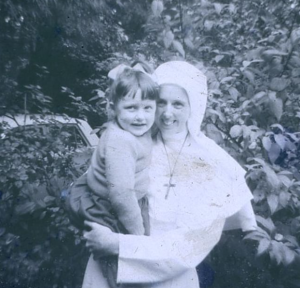 Encounters with people like this young man have repeatedly, over many years, demonstrated to Sr Joan the goodness, grace and hope to be found among people living in some of the harshest and most difficult situations. These encounters have shaped and formed Sr Joan, who has been a Josephite sister for 62 years. It is a life, she says, ‘of witnessing the power of God’ acting in the people she’s met and in all the places she’s served.
Encounters with people like this young man have repeatedly, over many years, demonstrated to Sr Joan the goodness, grace and hope to be found among people living in some of the harshest and most difficult situations. These encounters have shaped and formed Sr Joan, who has been a Josephite sister for 62 years. It is a life, she says, ‘of witnessing the power of God’ acting in the people she’s met and in all the places she’s served.
Born in Brunswick, in Melbourne’s inner north, Sr Joan grew up in a community where parish life and involvement in the Young Christian Workers (YCW) were active, vibrant and ‘second nature’. She remembers standing on the corner of Swanston and Bourke streets in Melbourne’s CBD one night, while waiting for the number 1 tram to Coburg, and thinking, ‘All these people I can see around me and up the hill are totally connected in every way—and God is in the midst of that.’
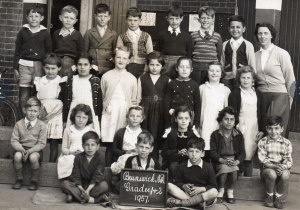 She studied teaching, worked in a state-run school and, while remaining active in her local parish and YCW, started to think more deeply about those on the margins—‘those who were left out’. The next step was to immerse herself in the lives of those living in difficult and often ‘deeply poor’ situations. They became the places where she’d find people of goodness and grace, and she joined with them in all that they were trying to do ‘to change a hard situation into something better’.
She studied teaching, worked in a state-run school and, while remaining active in her local parish and YCW, started to think more deeply about those on the margins—‘those who were left out’. The next step was to immerse herself in the lives of those living in difficult and often ‘deeply poor’ situations. They became the places where she’d find people of goodness and grace, and she joined with them in all that they were trying to do ‘to change a hard situation into something better’.
At the time of the Second Vatican Council, Fr Charlie Mayne SJ—rector of the seminary for the Archdiocese of Melbourne at the time—articulated a vision of mission in which the faithful lived among people at the margins, recognising God’s Spirit among them, and joining with them in their struggles for justice and equity.
Inspired by this vision, Joan (not yet a Josephite) went to live in a rooming house and worked in an egg-carton factory among other young women. She was struck straight away by their strong bonds of friendship, their generosity and their patience. While standing in thick, wet cardboard mulch, a team of women would place egg cartons (one per second) on a fast-moving conveyor belt, where the cartons were stamped. She recalls that when she felt tired and in need of a break, the other women would over-fill the machine to create some time for everyone to rest. She was moved by their spirit of generosity.
Still active in the YCW, Joan started an ‘open house’ on Johnston Street in Abbotsford, an inner-city suburb of Melbourne. Young women would ‘pile into’ the one-bedroom boarding house, finding refuge and safety within its walls. Again, in these experiences of walking beside some of the most vulnerable, she witnessed ‘great generosity and goodness’.
‘These encounters have been gift to me,’ Sr Joan says. ‘It has always been about recognising God’s Spirit already at work among these people and joining with it.
‘The YCW gave me the opportunity to begin with Jesus in the Gospel, to share that this whole world could become a kingdom of justice, peace and joy. I had already seen injustice and exclusion, and I longed for this Church that Jesus founded to be welcoming to all, especially those most marginalised; to cease making judgments; to be a place where the most marginal could feel at home.’
During this time, Joan came across a book about Mary MacKillop on a shelf in a library. She thought, ‘This is what Mary MacKillop’s doing. It’s a way of living where you can mingle with people right out there at the margins and find God there.’
These encounters have been a gift to me. It has always been about recognising God’s Spirit already at work among [the marginalised] and joining with it.
Mary MacKillop had written, ‘There where you are, you will find God.’ Reflecting on the fact that Mary McKillop had walked along the same streets that she was walking, the 25-year-old Joan thought, ‘Why not give it a go?’ She joined the Sisters of St Joseph in 1962 and continues to find inspiration from Saint Mary of the Cross MacKillop’s words: ‘Where there is a choice, go first to the most neglected parts of God’s vineyard.’
Joan and Mother Vera
(By Fiona Basile for Melbourne Catholic 13 December 2023)
John Drennan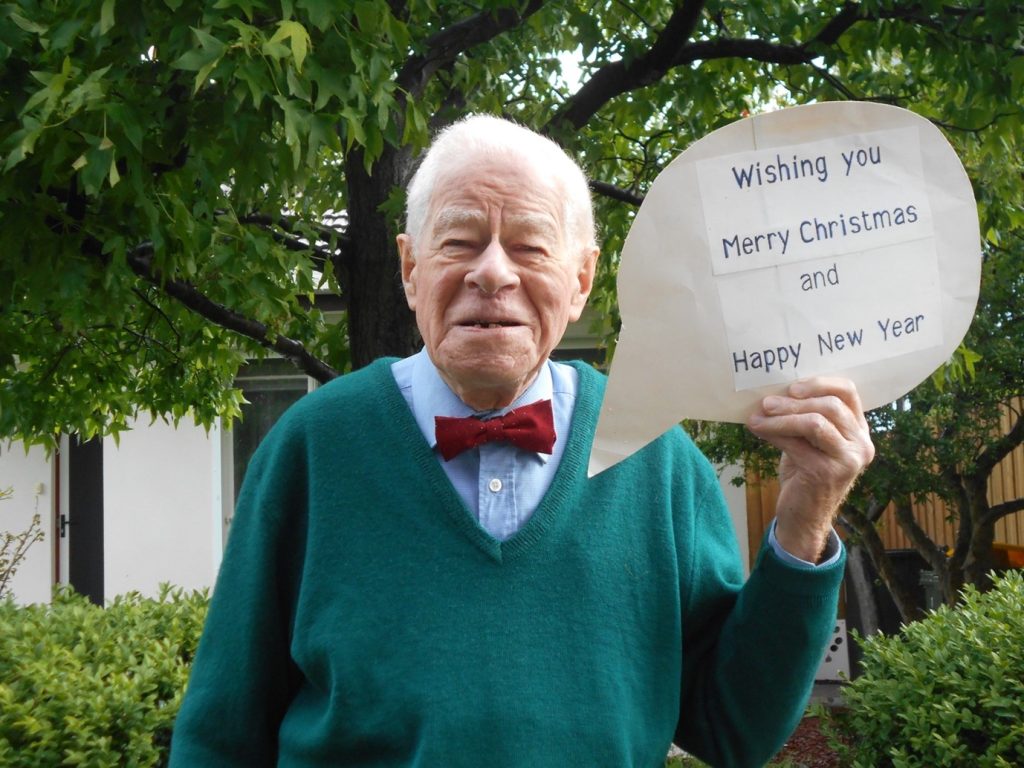
The year 2021 has marked the 50th anniversary of CCA-Aus (Catholic Concern for Animals – Australia), formerly ACSCAW (The Australian Catholic Study Circle for Animal Welfare), founded by Marion Craig (1907-2007) in 1971. following its parent body in England (founded 1930s). I have been its chairman from its beginning to the present day.
Born in 1934, five days before St. Carthage’s foundation stone was laid, I have been a parishioner since 1985, but sometimes attended Mass there during 1952-56. Growing up in my family’s Bendigo guest house, and assisting in its work, I listened intently to lengthy tales told by elderly guests born in the 1860s and later years. Thus began my lifelong interest in history, ecumenism, and Aboriginal justice. When I left school, everyone expected I would study to become a professional violinist. Instead, I mainly studied philosophy, following my childhood interest in that field and its relation to theology, history, language, science and education. I have pursued these investigations throughout life, but mainly not in official connection with universities (though I have acquired 23 relevant degrees and diplomas over time). I have extensively researched the history of higher education. I have kept a diary since 1944, filling one A5 page every day since 1 January 1959. Already six times as long as the Bible, it will go to the National Library in Canberra after my demise.
house, and assisting in its work, I listened intently to lengthy tales told by elderly guests born in the 1860s and later years. Thus began my lifelong interest in history, ecumenism, and Aboriginal justice. When I left school, everyone expected I would study to become a professional violinist. Instead, I mainly studied philosophy, following my childhood interest in that field and its relation to theology, history, language, science and education. I have pursued these investigations throughout life, but mainly not in official connection with universities (though I have acquired 23 relevant degrees and diplomas over time). I have extensively researched the history of higher education. I have kept a diary since 1944, filling one A5 page every day since 1 January 1959. Already six times as long as the Bible, it will go to the National Library in Canberra after my demise.
I have travelled extensively, observing especially the manifestations of religion, and teaching in 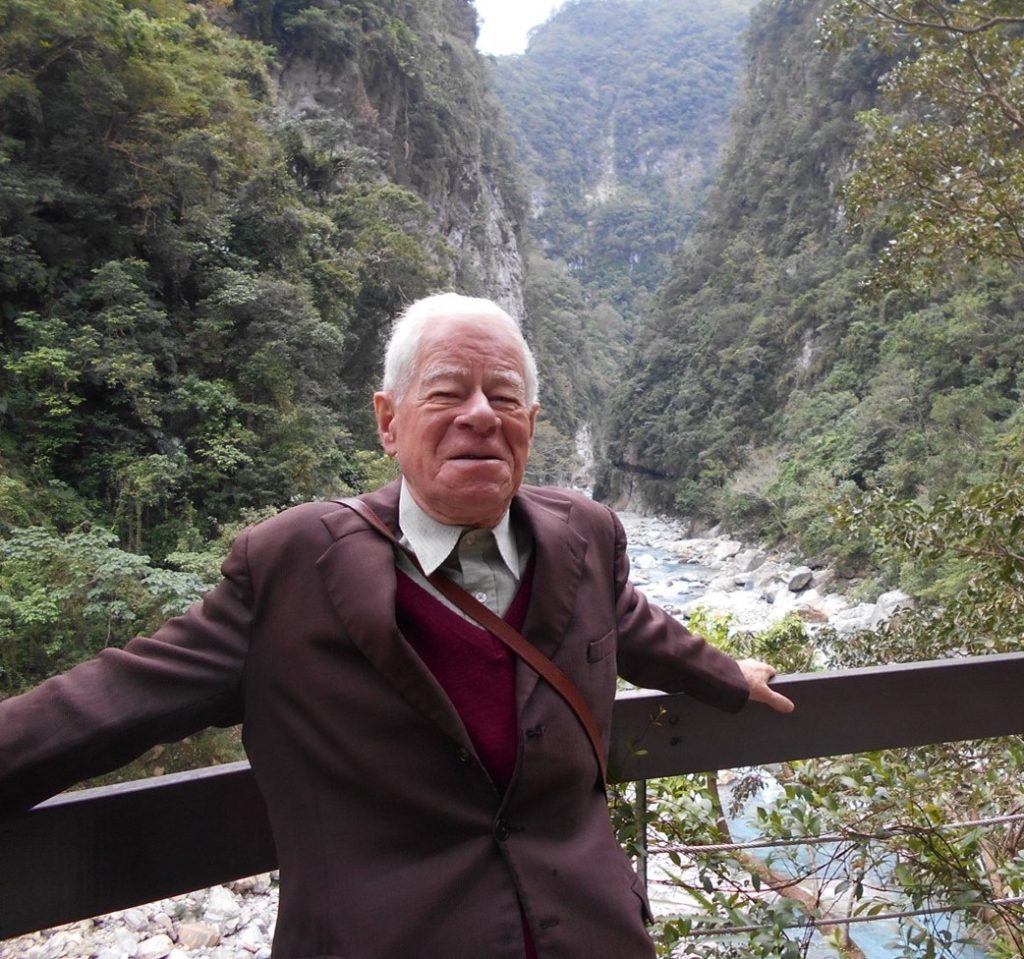 England, Sicily, and Saudi Arabia. My career was rather disjointed. Much of my life was spent in property management. Many years ago I planned to establish a trust to encourage Aboriginal agriculture/horticulture on (fully owned) land with houses I would donate for Aborigines’ beneficial ownership and cultivation. Regrettably, and incredibly, the intended trust property was severely diminished through the gross ineptitude and mismanagement of “experts” who had been recommended by senior Church persons and who acted in ways diametrically opposed to my instructions.
England, Sicily, and Saudi Arabia. My career was rather disjointed. Much of my life was spent in property management. Many years ago I planned to establish a trust to encourage Aboriginal agriculture/horticulture on (fully owned) land with houses I would donate for Aborigines’ beneficial ownership and cultivation. Regrettably, and incredibly, the intended trust property was severely diminished through the gross ineptitude and mismanagement of “experts” who had been recommended by senior Church persons and who acted in ways diametrically opposed to my instructions.
My special interest and concern is animal welfare, animal justice, and implementing (what is now called) animal theology. I deplore the fact that these occupy such a miniscule space in the Church’s history. There has been too exclusive an emphasis on moral areas that apply solely to humans, ignoring the enormous – and more fundamental – areas of commonality with animals (like soul and sentience), and excessive concern for how kindness to animals enhances one’s own virtue rather than primarily the good of animals themselves. Commendably, the Church now significantly supports ecological awareness and action. But here too there is a strong tendency for the need for animal justice to be subsumed under ecology. Pest animals and those of non-endangered species should equally be accorded rights. Where culling is needed, it should be done as humanely as possible. (I also strongly oppose the violence to property and lack of human concern of some animal activists.) I believe that promoting animal rights is no mere optional extra, but informs the very basis of ethics and theology.
___________________________________________________________________________________
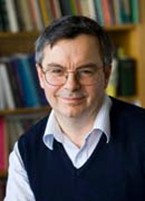 Constant J. Mews
Constant J. Mews
has been a member of St Carthage’s Parish since arriving in Australia in 1987 to take up a position teaching medieval history at Monash University, after studying at the University of Auckland, Oxford University and then for five years in Paris.
Since 1995 until his retirement at the end of 2021, he has been Director of the Centre for Studies Religious Studies at Monash University. He has been a visiting scholar at Paris, Princeton, Virginian and Cambridge. While his principal publications have related to the life and thought of Peter Abelard (The Lost Love Letters of Heloise and Abelard. Perceptions of Dialogue in Twelfth-Century France, 2nd edn Palgrave MacMillan, 2008; Abelard and Heloise, Oxford University Press, 2005), he has also published more broadly on the religious and intellectual history of medieval Europe. His interests range from the figure of St Carthage in seventh-century Ireland), to the visionary Hildegard of Bingen and the prolific female writer, Christine de Pizan in the early fifteenth century. He is particularly interested not just in the history of reform movements within the Church, but in broader issues of interreligious dialogue and intellectual renewal.
We congratulate Constant and thank him for his many years of teaching, supervision and dedication to Religious Studies in its many forms, here and in many venues overseas.
We now gratefully welcome Constant’s new role as Chair of the Parish Council
___________________________________________________________________________________
Susan Pascoe Adj Prof AM
We are blessed to have Susan in the parish, who has been elected as a member of the Vatican Commission on Methodology, planning for the 2023 Synod on Synodality.
FAICD, FIPAA, FACE
Susan Pascoe is Adjunct Professor at the University of Western Australia. She chairs the Australian Council for International Development (ACFID), the Community Directors Council, and Catholic Emergency Relief Australia (CERA). She is a Member of the Vatican’s Commission for Methodology planning the Synod on Synodality, a Trustee of St John of God Health, and a Board Member of Mercy Health. She was a member of the Governance Review Project Team established by the Australian Catholic Bishop’s Conference (ACBC) and Catholic Religious Australia (CRA) which produced the 2020 Report, The Light from the Southern Cross: Promoting Co-responsible Governance in the Catholic Church in Australia. She is currently on a review of Catholic Theological College, and of safeguarding for the OFM Holy Spirit Province. Susan Pascoe is Principal of Kadisha Enterprises consultancy.
Prof Pascoe was the inaugural Commissioner for the Australian Charities and Not-for-profits Commission (ACNC), Australia’s first national, independent regulator of charities from 2012 to 2017. Prior to this appointment, Prof Pascoe was Commissioner of the State Services Authority in Victoria, the body which oversaw good governance and conduct of individuals and entities in the public service. In this role she chaired or co-chaired independent reviews for government. She was appointed in 2009 as one of three Commissioners for the Royal Commission into Victoria’s Black Saturday Bushfires, after the loss of 173 lives and widespread destruction of flora, fauna and property.
Susan Pascoe’s earlier career was in education. She participated in state, national and international efforts to improve the quality and equity of education. She was Executive Director of Catholic Education in the Archdiocese of Melbourne, Chief Executive and Chair of the Catholic Education Commission of Victoria, and a member of the National Catholic Education Commission. She served as President of the Australian College of Educators, CEO of the Victorian Curriculum and Assessment Authority. In 2017 Prof Pascoe and Prof Deborah Brennan chaired a review into Early Childhood Education for the Council for the Australian Federation, culminating in the Lifting our Game report.
Prof Pascoe chaired the Australian National Commission for UNESCO, and was a Patron for the Melbourne Parliament for the World’s Religions. She is a Fellow of the Australian Institute of Company Directors, the Institute of Public Administration of Australia, and the Australian College of Educators. Her significant achievements and leadership were acknowledged in 2007 when she was appointed Member of the Order of Australia for service to education through a range of executive roles, and international initiatives to support educators in the Pacific region. In November 2016, she was awarded the Leadership in Government Award for her outstanding contribution to public administration in Australia. susan.pascoe@kadisha.com.au
___________________________________________________________________________________
Mark Perica
Warmest congratulations to parishioner Mark Perica, appointed Member of the Order of Australia (AM) in the Queen’s Birthday honours for services to the law and to industrial relations. Apart from his indefatigable work internationally for the ILO and nationally for worker rights and labour reform, Mark has been a generous and thoughtful contributor to the parish’s growth through work on the Council, on its Constitution and with wise advice.
https://documentcloud.adobe.com/link/track?uri=urn:aaid:scds:US:6c0e7d06-fd60-48d2-a3b9-7ed1c92a193a
If anyone has something to share with the whole Parish, please let us know; e.g., autobiography, 25/50 wedding anniversaries, other special occasions. We can add it to “Get to know our Parishioners.”
Email: parkville@cam.org.au, or Constant.Mews@monash.edu or Telephone: (03) 7036 9393.
The New Parish Crest
The crest was designed to represent various aspects of the Parish life. The motto, “God’s Providence is our inheritance”, is the motto of
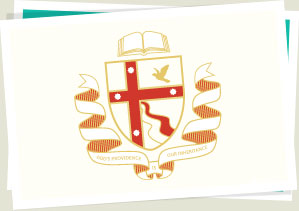
Lismore in Ireland. The red cross makes an allusion to the emblem of the Royal Melbourne Hospital. The gold stars of the Southern Cross, a traditionally Australian symbol, are also found on the crest of The University of Melbourne. The Parish has a long association with both institutions.
The book indicates the Bible and study. The sparrow is referred to in Psalm 84, “Even the sparrow finds a home”. The blood and water flow from the Cross as the life of the Church, evoking images of the Eucharist and Baptism.
